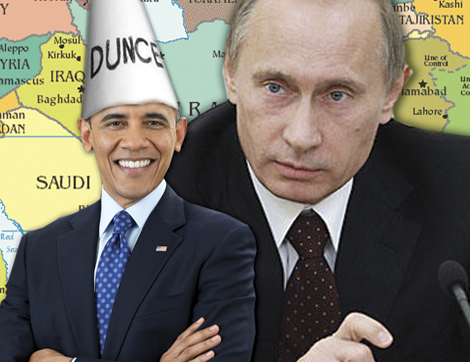
By Richard Walker
Russia’s dramatic return as a major player in Middle East politics has not only forced Barack Hussein Obama II back to the drawing board to reset his Syria policy but has persuaded him to rethink his Iran strategy before Russian President Vladimir Putin again upstages him.
Al Hayat, a London-based Arab newspaper, recently broke the news that the Sultan of Oman had been a conduit for letters from Obama to the new Iranian president, Hassan Rouhani, seeking to kick-start talks to resolve Iran’s nuclear stand-off with Washington. The story was picked up across the globe leading to speculation it was an effort by Obama to pave the way for direct talks between the two governments.
The Jerusalem Post, while reporting the story, did not appear to place too much emphasis on it, preferring instead to highlight Washington criticism of the new Iranian leader and point to Iran’s failure to give up its nuclear program.
Giving up the nuclear program is something the new Iranian leader, who is regarded by Washington as more amenable to direct talks that his predecessor, is not prepared to do. He has already has made that clear to Muslim clerics in Teheran. His tough stance on that issue may have been bolstered by the recent Russian announcement that the Russians are prepared to build another nuclear reactor in Iran. Russia may also be on the verge of supplying Iran with its S-300 missile system, which would provide it with highly sophisticated air defenses.
Watching all of this, Israel and its supporters on Capitol Hill must be upset that their dreams of regime change in Syria and Iran may soon be a distant hope. On the other hand, they will know it is nothing new for Obama to write letters to Iran’s leaders. He did so in 2009, and it came to nothing because Israel dominated the Iran debate with a constant drumbeat for war and the backing of the mainstream media and neocons on Capitol Hill.
But much has changed since Iran was in Israel’s crosshairs, facing daily threats of airstrikes. There is now a new reality of Russian involvement in the region and every reason for Obama to fear being upstaged over Iran by Putin. Obama has to be aware that his counterpart has been busy resetting the Moscow-Tehran relationship, making it clear to everyone that Russia has a vested interest in preventing an attack on Iran.
Russia has a close economic and military relationship with Iran. In 2007 Moscow supplied the Iranians with a short-range anti-aircraft missile system, the TOR-MI.
The view in Moscow is an attack on Iran would be catastrophic for the region and for the Caucusus bordering Russia. Those dangers have not been lost on Putin. He became the first Russian leader since Stalin to visit Iran in 2007, indicating he recognized its geopolitical importance to the region and beyond. His decision to re-engage seriously with Iran and its new president, which he has already done privately and publicly, speaks to his determination to see a resolution to the Iran issue through some kind of diplomatic deal and not through the Israeli solution of all-out war.
Putin knows the American people have no appetite for another war, especially one with Iran, which would be devastating to the United States. By moving closer to Iran, Putin has forced Obama to think again about the drumbeat of war that has echoed loudly out of Tel Aviv and the corridors of Capitol Hill. He has also put Israel on notice that Russia has a stake in Iran’s future.
Putin may dust off an offer he made back in 2006 to have Russia enrich Iran’s uranium. That could break D.C.’s Iran sanctions policy.
Whatever happens, Obama knows the Iran issue, like others in the Middle East, will no longer be dominated solely by Washington and its allies, especially Israel.


